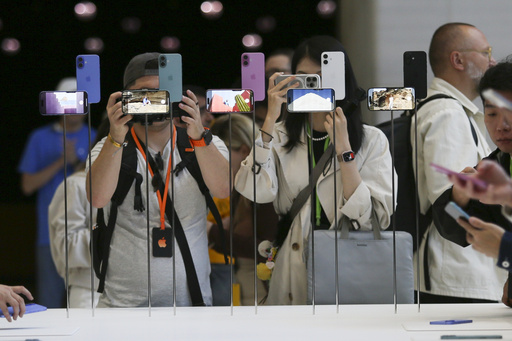Apple is giving more people the chance to test a software update that will implant artificial intelligence into its virtual assistant Siri and automate a variety of tedious tasks on the latest iPhone coming out Friday.
The free update was made available Thursday to an audience that has signed up to test Apple’s software before it’s released to all iPhone owners next month. As of Thursday, only two premium iPhones that came out last year contain the souped-up processor required to power the AI features included in the update, but that will change Friday when four new iPhone 16 models reach store shelves.
All the iPhone 16 models, with starting prices ranging from $800 to $1,200, are equipped to handle the new technology, which the company is marketing as “Apple Intelligence.” That branding is part of an effort to distinguish the iPhone’s AI from similar technology already available in smartphones released earlier this year by Samsung and Google.
The AI features are being promoted as one of the main reasons to buy an iPhone 16, so releasing a test version of the software powering the technology now may prod more consumers to splurge on one of the new models as soon as possible
The AI technology is coming out in U.S. English only for now, but will expand into localized English in Australia, Canada, New Zealand, South Africa, and the U.K. in December. Apple plans to expand into other languages and countries next year. The testing of the AI software is beginning just a few days after Apple released its latest mobile operating system, iOS 18, to all its earlier iPhones.
Once the iOS 18.1 upgrade is installed, the often bumbling Siri is supposed to become more conversational, versatile and colorful, with a glowing light that will rotate around the iPhone’s screen as it responds to requests. While Apple is promising Siri will be able to perform more tasks and be less prone to becoming confused, it won’t be able to interact with other apps installed on the iPhone until another software update comes out at a still-unspecified date.
Other AI features in the software update will handle a variety of writing and proofreading tasks, summarize the content of emails and other documents. The AI also will provide a variety of editing tools to alter the appearance of photos and make it easier to find old pictures.
But the initial update doesn’t include other AI tricks still to come, such as the ability to create customized emojis on the fly or conjure other fanciful imagery upon request. Apple also plans to eventually enable its AI suite to get a helping hand from OpenAI’s ChatGPT when users want it.
Besides the new iPhone model, Apple’s AI features also will work last year’s iPhone 15 Pro and iPhone 15 Pro Max because they have the special computer chip that’s required. The update will also bring the ability to record spatial video on those two iPhone 15 models that can be watched on Apple’s $3,500 Vision Pro headset.
But the AI won’t work on hundreds of millions of other iPhones that are still in use, a drawback that investors are betting will juice Apple’s recently slumping sales of the ubiquitous device.
That expectation is the main reason that Apple’s stock price has climbed by more than 15% since the company previewed its AI strategy in June, creating $500 billion in shareholder wealth. Some analysts believe the demand for new iPhones could propel Apple’s market value above $4 trillion for the first time within the next year.
This website uses cookies so that we can provide you with the best user experience possible. Cookie information is stored in your browser and performs functions such as recognising you when you return to our website and helping our team to understand which sections of the website you find most interesting and useful.
